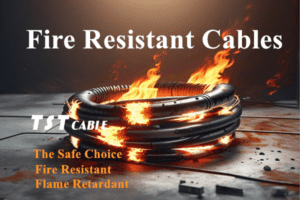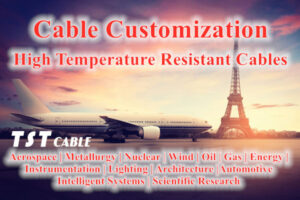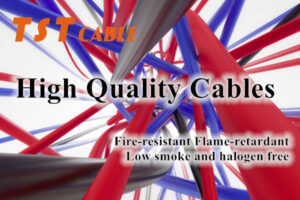
- Home
- /
- vehicle traction system
Application of Cables in Vehicle Traction Systems
1. Scene Introduction
As the power core of train operation, the traction system of rail transportation vehicles is responsible for providing stable and efficient traction force for trains. With the continuous progress of rail transportation technology, the performance and efficiency of traction system is also continuously improved. The performance and quality of traction system cables, as key components for connecting traction equipment, transmitting power and control signals, directly affect the overall performance of the traction system. Therefore, professional rail transit vehicle traction system cable solutions are of great significance to ensure the safe and stable operation of trains.
2.Pain point analysis
In the existing rail transit vehicle traction system, the following pain points exist in the vehicle traction system cable:
Inadequate transmission performance: traction system cables need to transmit a large amount of power and control signals, if the transmission performance of the cable is poor, it may lead to power loss, signal distortion and other problems, affecting the normal operation of the traction system.
Reliability problems: due to the complex working environment of the traction system, the cable is susceptible to vibration, high temperature, humidity and other factors, resulting in cable aging, breakage and other failures, affecting the safety and stability of the train.
Installation and maintenance difficulties: the laying and installation of traction system cables need to take into account the spatial layout of the train and the electromagnetic environment, while the cable maintenance and management also requires professional technical support, which increases the difficulty and cost of the work.
3.The vehicle traction system on the cable requirements
For the characteristics of the vehicle traction system, the cable needs to meet the following requirements:
High transmission performance: the cable should have excellent electrical conductivity and low impedance, in order to reduce power loss and improve the quality of signal transmission.
High reliability: the cable should have good durability and anti-aging properties, can be in high temperature, vibration and other harsh environments such as long-term stable operation.
Electromagnetic compatibility (EMC): the cable should have good electromagnetic shielding performance to resist external electromagnetic interference and ensure the stability of signal transmission.
4. The certification standards
In order to ensure that the performance and quality of the cable meet the industry requirements, the cable products in this solution fully comply with the following international and domestic certification standards:
IEC 60349: the international standard for rail transit vehicle cables, which strictly stipulates the electrical performance, mechanical performance and environmental adaptability of cables.
EN 50264: European standard for cables used in rail transportation, which puts forward specific requirements for cables in terms of flame retardancy and oil resistance.
RoHS: A directive restricting the use of certain hazardous substances to ensure that cables are environmentally friendly during production and use.
GB/T 12706 is a Chinese national standard mainly applicable to extruded insulated power cables and their accessories with rated voltage from 1kV to 35kV.
TB/T 3159 is the Chinese railway industry standard, specifically for rolling stock cables.
In addition, TST CABLES products have been certified by quality management system (such as ISO 9001), environmental management system (such as ISO 14001) and product certification.
5.Cable Selection
For the special requirements of vehicle traction systems, we recommend the following cable options:
High-temperature-resistant cable: adopting special insulating materials and sheath materials, it has high heat-resistant performance and can work stably for a long time under high-temperature environment.
Flexible cable: with good flexibility and bending performance, adapt to the complex wiring environment inside the train, reduce the failure rate of the cable due to vibration.
Shielded cable: adopting multiple shielding structure, effectively suppressing electromagnetic interference and ensuring stable transmission of power and control signals.
Selection parameters for reference (can be customized according to actual needs)
Temperature resistance: -40°C to 125°C
Rated voltage: 600V (test voltage 3500V/5min)
Meets EN50200 30min and 90min requirements
HL3 in accordance with EN45545-2 R15/R16
6. Product Characteristics
The cable products in the vehicle traction system solution have the following characteristics:
Excellent transmission performance: the use of high-purity conductors and high-quality insulation materials reduces power loss and improves signal transmission quality.
High reliability: the cable structure is sturdy, with excellent anti-aging performance, and can operate stably for a long time in various harsh environments.
Good electromagnetic compatibility: the use of advanced shielding technology, effective resistance to external electromagnetic interference (EMI) shielding, to ensure the stability of signal transmission.
Recommended Products
Vehicle traction system cables have a rated voltage of 600V and are resistant to high temperatures. They are an integral part of transmitting power and control signals between the propulsion system and traction components (such as motors and wheels).
7. Technical Tests
To ensure the performance and quality of cable products, TST CABLES conducts a series of rigorous technical tests, including:
Electrical Performance Test: Test the electrical parameters such as electrical conductivity, insulation resistance, voltage withstand of the cable to ensure that it meets the design requirements.
Mechanical performance test: testing the cable’s tensile strength, bending performance, abrasion resistance and other mechanical properties to ensure its stability during train operation.
Environmental adaptability test: Place the cable in high temperature, low temperature, humidity and other harsh environments for a long time to verify its environmental adaptability.
Electromagnetic compatibility test: test the signal transmission performance of the cable in the electromagnetic interference environment to ensure that it has good electromagnetic shielding capability.
8. Cable laying installation and commissioning
In the process of cable laying and installation, we will formulate a reasonable cable alignment plan according to the layout of the traction system and the spatial structure of the train. At the same time, TST CABLES provides professional commissioning guidance to assist customers to complete the connection and commissioning of the cable and traction system to ensure the normal operation of the system.
9. After-sales maintenance & technical support
TST CABLES provides comprehensive after-sales maintenance and technical support services, including regular cable inspection, troubleshooting, repair and replacement. Our professional team will provide customers with technical support and solutions at any time to ensure the stable operation of the traction system cable and customer satisfaction.
10.Actual Cases
TST CABLES vehicle traction system cable solutions have been successfully applied in rail transit lines in many cities around the world. Taking the metro lines in large cities in China as an example, after adopting this solution, according to the actual test data, the power loss of the rail transit vehicles with advanced cable solution can be reduced by about 5% to 10%, and its cable failure rate can be reduced by more than 30%.
In summary, TST CABLES cable solutions for rail transit vehicle traction systems have excellent product performance, strict quality control and comprehensive technical support. We will continue to be committed to providing our customers with better products and services to promote the healthy development and safe operation of the global rail transportation industry.
Other solutions for cables in railway applications.
WHY CHOOSE TST
10 years of experience
Specializing in the production of railway cables for 10 years
Engineer-to-engineer one-on-one support
Engineers provide one-on-one service to assist with product selection and problem-solving
Customization according to requirements
With a strong R&D team, we support customized cables based on specific needs
Quality certification
Stringent adherence to industry standards, complete certification
Fully testing facilities
Various tests based on customer requirements
10,000 ㎡ factory
Welcome to visit our factory face to face





